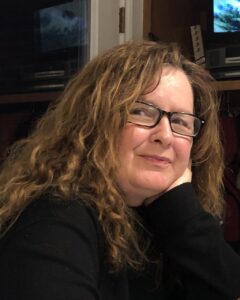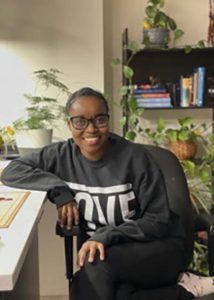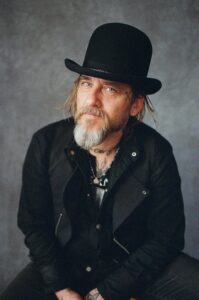Deb Dundas
 Deb Dundas says her “pandemic project” was to get a master’s and write a book. She accomplished both through the King’s MFA in Creative Nonfiction—her first book was published on May 9, and she’s already signed a deal with a major publishing house for the next one. These may seem like lofty goals, but for Dundas, they were a long time coming.
Deb Dundas says her “pandemic project” was to get a master’s and write a book. She accomplished both through the King’s MFA in Creative Nonfiction—her first book was published on May 9, and she’s already signed a deal with a major publishing house for the next one. These may seem like lofty goals, but for Dundas, they were a long time coming.
“I’ve wanted to write a book since I was a kid, and I always kind of thought I was going to be a writer,” she says. And she did—working as a journalist for CTV News and the Toronto Star, but the dream of writing a book never went away.
She originally came to the King’s program intent on telling her husband’s adoption story—how he found out when he was 42 that he was adopted, and his journey to reuniting with his biological family. However, those plans were put on hold when she was approached by the publisher at Biblioasis and asked to write a Voltaire-style pamphlet on the issue of class.
“(The idea was) to take current ideas and revive that form of pamphleteering, which is ideas distilled and sharpened into a small book,” she explains. “That ended up being what I did partly through the program … I got my first copies yesterday.”
But there was also an appetite for the adoption story, which was picked up by a large publisher as part of an anthology of adoption stories—stories they asked Dundas to write.
“It was something (they) had playing around in the back of their minds for a long time. And they just were waiting for the right writer,” she says. “The idea is … it will be a 360 look at adoption through all sorts of people’s eyes and different perspectives.”
Working on her project within the King’s program offered the accountability, mentorship and positivity Dundas said she needed to finish her book. And she intends to carry that with her into the future.
“It makes you realize that you can’t allow life to entirely get in the way,” she says. “I think so many of us have unfinished projects—this teaches you how to finish it.
One of the biggest shifts Dundas has noticed since completing the program is her perspective—writing is part of her daily life. It’s who she is.
“I think of myself as a writer now,” she says. “Before I thought of myself as a journalist or an editor—mostly an editor, I think, but I always wanted to be a writer.”
“It makes you realize that you can’t allow life to entirely get in the way … I think so many of us have unfinished projects—this teaches you how to finish it.”
Valerie Chelangat
 Like many people who pursue an MFA, Valerie Chelangat was looking for a writing community and to carve out time to focus on her writing. She needed a space that would instill discipline and a habit for continuous writing. She found all that and more through King’s nonfiction program.
Like many people who pursue an MFA, Valerie Chelangat was looking for a writing community and to carve out time to focus on her writing. She needed a space that would instill discipline and a habit for continuous writing. She found all that and more through King’s nonfiction program.
“I’ve wanted to write a book for a long time, and I needed to find the time, just by being part of a program and having pages due by such a date,” she says. “I really liked having the opportunity to interact regularly with other people who are pretty much in the same situation as me, who are trying to write, and many of them are writing their first book.”
Chelangat is very much immersed in the literary world. She founded Tusome Books in 2019—an online bookstore dedicated to intentional reading that showcases diverse authors and provides curated reading plans designed to address unconscious bias. It was this work that inspired the book project she worked on during her MFA.
“At my bookstore, we sell books that focus on underrepresented authors,” she says. “My book is about the importance of widening the scope of our reading and making sure we’re incorporating people who are underrepresented.”
Though her manuscript is not yet complete, Chelangat is proud of her progress and the discipline she developed. Learning to accept and integrate feedback from fellow students and mentors also contributed to her growth as a writer, she says.
“Before I came into the program, I don’t know that I recognized the diligence required to produce quality work because I was writing on my own for the most part,” she says. “I didn’t have a community of writers, mentors, and skilled instructors to offer suggestions and questions that challenged me.” The University of King’s College filled that gap for Chelangat. “It’s very rewarding. After you’ve gone through all of that, and you’re on the other side of it, it’s beautiful.”
In the near term, Chelangat is focused on finishing and revising her manuscript, then she has another idea she would like to develop. “Momentum is important,” she says. “I used to wait to be inspired to write but now I have developed the habit of writing daily. If I wait for inspiration to spark it takes much longer to make progress.”
“It’s easy to get discouraged, especially when things aren’t going the way you imagined they would,” she says. “That could happen, but just keep going anyway. Keep trying and keep working on your craft.” She adds, “you’ll have the opportunity to finish your manuscript but even if that doesn’t happen to you, you’ll make incredible progress and gain a network of writers. A valuable addition that you get to keep onwards.”
“Before I came into the program, I don’t know that I recognized the diligence required to produce quality work because I was writing on my own for the most part … I really liked having the opportunity to interact regularly with other people who are pretty much in the same situation as me, who are trying to write, and many of them are writing their first book.”
Joel Thomas Hynes
 Joel Thomas Hynes’s list of accolades is long—he is the recipient of numerous literary awards for his fiction, has written, produced and starred in shows on the CBC, and is a musician to boot. Despite all his success, Hynes says he has always been drawn to higher education, and the King’s Master of Fine Arts in Creative Nonfiction felt like the perfect fit.
Joel Thomas Hynes’s list of accolades is long—he is the recipient of numerous literary awards for his fiction, has written, produced and starred in shows on the CBC, and is a musician to boot. Despite all his success, Hynes says he has always been drawn to higher education, and the King’s Master of Fine Arts in Creative Nonfiction felt like the perfect fit.
“I felt a little too far along in my career to start over with a bachelor’s degree,” he explains.
Hynes says he came to the program with two potential writing projects: a memoir and an investigative piece about a controversial conviction near his hometown in the mid-80s. Though he tried to honour both, he ultimately focused on the memoir, which he describes as “a cheeky ‘dramatized’ memoir written in the second person—kind of like Bright Lights, Big City.”
Writing aside, Hynes said he loved the structure of the program—particularly the workshops and book reports.
“I love to read. I love to learn through literature. I love to find meaning in literature,” he says. “So for me, it was such a bonus to be immersed in all that critical reading and writing.”
Hynes is still working on both projects and says they now fall into his “five-year” writing plan. In an interesting turn of events, studying nonfiction writing inspired him to write a new novel, which he’s currently working on.
“It represents a departure I’ve been leaning toward for a long time but perhaps have been afraid to pursue,” he says. “The irony is that the MFA program in nonfiction gave me the confidence and the drive to write the type of fiction I’ve always wanted to write.”
Hynes’s advice to aspiring writers? Show up and write no matter what.
“I write every day. Even when it sucks, and I don’t want to do it, and I have nothing to say—which is a lot of the time,” he says. “Showing up is the hardest part. So if I show up every day, I make progress every day. And when I make progress in my writing, my life is generally better.”
“I love to read. I love to learn through literature. I love to find meaning in literature … So for me, it was such a bonus to be immersed in all that critical reading and writing.”

